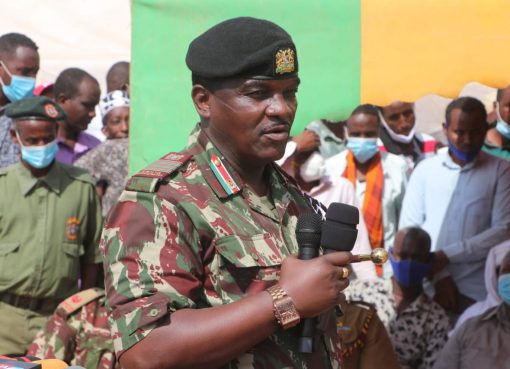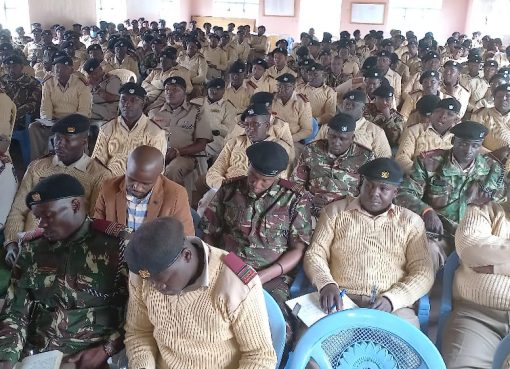Governors from Turkana, Elgeyo Marakwet, West Pokot and Baringo counties have been urged to enhance their unity and advocate economic investment and also promote initiatives to foster peace.
In a joint communiqué 57 professionals from the four devolved units indicated that towards finding a lasting solution to banditry and cattle rustling menace the counties should come up with a joint strategy of utilizing available resources and allocation of resources to boost industrial development and create employment opportunities.
They noted that the counties face similar challenges that require unity of purpose to find lasting solutions through harnessing their joint economic power, potentials and resources. By doing so they added, the Governors would open doors for residents including the youth some of whom have been involved in acts of lawlessness, to do business and foster international trade.
The communiqué that is a culmination of three day deliberations on finding alternative lasting solutions to armed conflicts in the restive North Rift was read in turns by Messrs Laurence Mutwol, Joseph Riwawale and Joseph Atan and Ms Alice Cherem on behalf of professionals from Elgeyo Marakwet, West Pokot, Turkana and Baringo Counties respectively.
Also present during the talks that were held at a Nakuru hotel sponsored by the National Cohesion and Integration Commission (NCIC) and the European Union.
Similar talks are lined up for professionals from Samburu, Laikipia and Isiolo counties.
The professionals stated that other than security operations, Governors, Members of Parliament, Members of County Assemblies, Councils of elders and religious leaders should work with the national government in addressing the cultural, political, social and economic challenges that have escalated the conflict.
These efforts they added should be complemented by heavy investment in the education infrastructure in the region.
The incentives, they said, should range from free meals for pupils, availability of learning materials, scholarships for bright students, better remuneration and allowances and security for teachers working in these regions.
“There is a need for alternative solutions, including infrastructure investment and revamping security, to open up the region for development and investment. Education is one of the best de-radicalization tools that can help reprogramme the cultural connection with banditry. Exposure to modern education will shift the banditry ideology and provide them with alternative knowledge, competence, and skills needed in modern society,” the communiqué read in part.
It went on “Leaders must acknowledge that failure to address the cultural connection with banditry will only provide temporary solutions. The government needs to integrate economic empowerment activities with de-radicalization approaches,”
The professionals indicated that forming an economic bloc would be a fundamental step that could open up the region to investments in tourism and other sectors that boost economic development, the cohesion of the people and peace through economic empowerment and initiation of multi-billion-shillings projects, transforming the local economy.
While noting that it was encouraging to see the government change its tact by investing in drone surveillance technology, they highlighted a need to invest in community-based intelligence and inter-communal peace initiatives.
They observed that constructive community engagements involving warring local communities in the volatile North Rift can play an instrumental role towards curbing banditry.
The group maintained that a holistic and collaborative approach, that is community-centric and devoid of blame game and political finger-pointing, portends viable solutions to resolving the conflict.
“With local communities taking a prominent role in crafting the solution, policymakers will be in a position of strength to make informed decisions on navigating the rough terrain. It is only the people of Baringo, Turkana, West Pokot and Elgeyo Marakwet, who can find solutions to their problems,”
The professionals noted it was time the communities developed mitigation measures before involving the government in the processes rather than the government taking the lead role.
They said creating linkages between grassroots communities, the government and non-governmental organizations through collaborations and trust-building will go a long way in fostering peaceful co-existence in the region.
According to them an all-inclusive community-led initiative would encourage cooperation and create incentives for collective action and assist parties to the conflicts to end hostilities as it enables addressing the root causes of the problem.
“These communities have coexisted for decades and had ways of resolving conflicts. Giving them a free hand to develop and structure their solutions to the problem will provide appropriate insight into the issues at hand,” read the communiqué.
They called on politicians, religious leaders, civil society and opinion makers not to tire of sensitizing the community on the importance of education adding that banditry was not a sustainable lifestyle.
The professionals regretted that banditry has frustrated some leaders and Kenyans of goodwill, who would like to see a long-lasting resolution that would usher in peace and development.
“We must appreciate that a comprehensive, inclusive approach led by the community may lead to the recovery, reconstruction and development in these regions that have borne the brunt of resource-based conflicts for a long time,” they said.
Mr Kona observed that as there is limited or no education, there are few professionals in the areas and that they relied on imported services from other counties.
While indicating that more than 50 professionals including security personnel have been killed in the four counties with Elgeyo Marakwet alone accounting for over 20 of the cases Mr Kona said that those sent to these areas always ask for transfers due to attacks and horrible work environments.
“Not all professionals are lucky to survive the attacks. There have been reports of murdered professionals over the years. The police are not exempted from these deaths. The bandits indiscriminately kill the people sent to help, which leads to other professionals refusing to be deployed there,” the Commissioner pointed out.
By Anne Mwale




